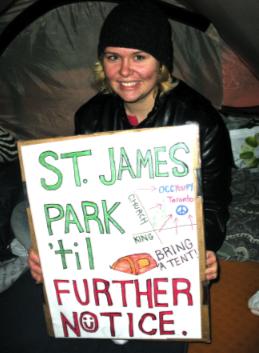
Elizabeth Troughton wants to see a greater queer presence at Occupy Toronto. Credit: Katie Toth
From Rome to Cape Town, London to Buenos Aires, the world has been occupied.
The anti-corporate Occupy Wall St movement has been spreading, pulling together disparate but passionate activist groups hoping to end economic inequality and corporate avarice.
Toronto’s small Occupy puzzle piece is nestled between Church and Jarvis streets in St James Park, ensuring it has a slight pink tinge as some outspoken members of the queer community bring their issues to the mostly straight encampment.
Anastasia Zavarella, one of hundreds of demonstrators taking part in the protests, says she wants to see more people from the queer community fighting capitalism, rather than participating in it.
“Whoop-de-fucking-doo that Apple’s new CEO is a gay man,” she says. “That’s not super helpful for those of us that are in massive amounts of debt, had our land stolen hundreds of years ago, are coping with disabilities in a healthcare system that marginalizes us and rejects us on multiple levels due to our queerness and perhaps being trans and perhaps having a disability. No, participating in capitalism, that’s not going to help at all.”
Occupy Toronto’s Darryl Richardson calls himself an ally to the LGBT community. “I came down here and the atmosphere infected me,” he says. “Everybody is included here; there is so much support.
“We’re here to talk about issues that affect all of us,” Richardson adds. “Part of equality is that we can’t say that queer, bi, trans people are affected by different issues than we are . . . everybody is affected by inequality or discrimination in one way or another.”
However, Elizabeth Troughton, who is on the LGBTQ committee at Occupy Toronto, says the queer presence hasn’t been as big as she’d hoped it would be.
“We [the committee] have only met twice. The first time we met there were 19 people, and that was really good,” Troughton says, noting that numbers have dropped off. “I don’t really know why there hasn’t been as much involvement as there could be with the queer community, but I just haven’t seen it.
“So far we’ve created safe spaces for LGBT people who don’t see themselves represented in the camp,” she says. “If that’s the reason they’re not coming out, we’ve talked about setting up tents for people who want to get involved but who might not want to share a tent with somebody who might be transphobic, homophobic or otherwise oppressive to them.”
Stefonknee Wolscht, a trans woman who has been a key organizer with the protest, says she is surprised by people’s willingness to educate themselves about queer issues. “People are willing to learn, and I’ve been treated very well here,” she says.
The first few days were an adjustment. “I have heard comments from different people in the crowd saying, ‘There’s a guy in a dress’ or something like that,” she says. “People said, ‘Excuse me, she’s transgendered, and she happens to look good in a dress’ . . . then very quickly it didn’t happen anymore.”
Emily Green, who identifies as bisexual and disabled, thinks Toronto’s movement is unique in the steps it has taken to accommodate the queer community.
Green says it’s an aspect of Occupy Toronto she hasn’t seen at other protests or other Occupy groups around the world. “I think that’s a major strength to our movement here in Toronto,” she says. “We’ve got a woman’s safe area, we’ve got a quiet area where you can go meditate, we have people on the Occupy Toronto staff who are LGBTQ themselves and understand where people are coming from.”
Wolscht says she’s found a community that’s different from the one she sees in the Village. “Quite often the discrimination of trans people I feel comes directly from the corner of Church and Wellesley,” she says. “You don’t go into battle and leave someone behind. Whether it’s trans people, sex workers . . . the war’s not over.”


 Why you can trust Xtra
Why you can trust Xtra


